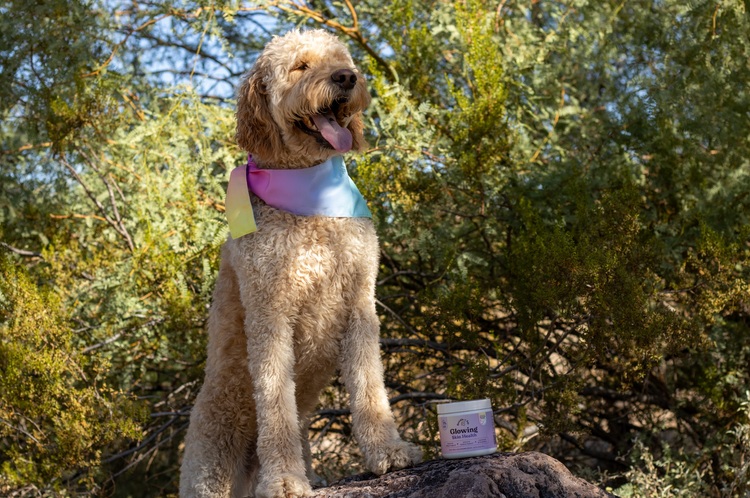Seasonal Allergies or Food Allergies? How to Tell What’s Affecting Your Dog

Does your dog scratch incessantly, experience ear infections, or show signs of skin irritation? Allergies can manifest in many ways, but determining whether they stem from food or the environment can feel overwhelming. Understanding the difference is crucial for improving your dog’s quality of life, and their gut health may play a bigger role than you think.
This guide explores how to distinguish between seasonal and food allergies, common allergens, and how gut health supports a robust immune system and a healthier pup.
Signs Your Dog May Have Allergies
Common allergy symptoms in dogs include:
- Itchy skin (paws, ears, belly)
- Chronic ear infections
- Gastrointestinal issues (vomiting, diarrhea)
- Red, inflamed skin or hives
- Excessive licking or chewing

The challenge lies in identifying the cause. Here’s how to differentiate between seasonal and food allergies:
Seasonal Allergies
Seasonal allergies are often caused by environmental factors like pollen, mold, and dust mites. Dogs typically experience symptoms during certain times of the year.
Key Indicators:
- Symptoms worsen in spring, summer, or fall.
- Increased scratching after outdoor exposure.
- Symptoms are concentrated around the paws and face.
Management Tips:
- Wipe your dog’s paws and coat after walks.
- Use hypoallergenic shampoos to soothe irritated skin.
- Consider supplements with omega-3 fatty acids, turmeric and colostrum for anti-inflammatory benefits.
Food Allergies
Food allergies can occur year-round and often result from an immune response to specific proteins or ingredients.
Common Culprits:
- Beef
- Chicken
- Dairy
- Wheat
- Soy
Key Indicators:
- Symptoms persist regardless of season.
- Chronic ear infections or yeast overgrowth.
- Gastrointestinal distress (e.g., vomiting, diarrhea).
A food elimination trial is the gold standard for diagnosing food allergies. This involves feeding your dog a novel protein and limited ingredient diet for 8-12 weeks and monitoring for improvements. Look for foods that indicate they are poultry-free to avoid the common allergen of chicken, while also looking for a food where a single protein is the #1 ingredient.
The Role of Gut Health in Allergies
A healthy gut microbiome plays a pivotal role in managing allergies. Research published in Frontiers in Veterinary Science highlights the connection between gut health and immune response in dogs. A balanced gut microbiome can:
- Reduce inflammatory reactions.
- Strengthen the skin barrier.
- Support overall immune function.
Ingredients to Improve Gut Health:
- Pumpkin: High in fiber and prebiotics to nourish beneficial gut bacteria.
- Probiotics: Found in fermented foods or supplements, probiotics improve gut microbiome diversity.
- Omega-3 Fatty Acids: Reduce inflammation and promote a healthy skin barrier.
- Sweet Potatoes: A gentle carbohydrate rich in fiber and antioxidants.
Bundle x Joy: Allergy-Friendly Nutrition
At Bundle x Joy, we understand the challenges of managing allergies while providing complete nutrition. That’s why we prioritize:
- Responsibly sourced proteins: Including novel and hypoallergenic options like Salmon or Lamb.
- Gut-friendly ingredients: Like pumpkin, sweet potatoes, and flaxseed.
- No list: Our products are free from common allergens like soy, wheat, and artificial additives.
Our formulas are designed to boost your dog’s gut health, helping them live their happiest, most joyful life.
Steps to Help Your Dog
- Consult Your Veterinarian: Rule out other conditions and get guidance on elimination diets.
- Focus on Gut Health: Incorporate gut-friendly, anti-inflammatory ingredients to support their immune system.
- Track Symptoms: Keep a journal to identify patterns or triggers.
- Choose Allergy-Friendly Food: Bundle x Joy’s gut-boosting formulas are crafted to nourish your dog inside and out.
Distinguishing between seasonal and food allergies can be challenging but is essential for your dog’s well-being. By addressing potential allergens and supporting their gut health, you can help your pup thrive. Explore Bundle x Joy’s allergy-friendly products and take the first step toward a happier, healthier life for your pup!